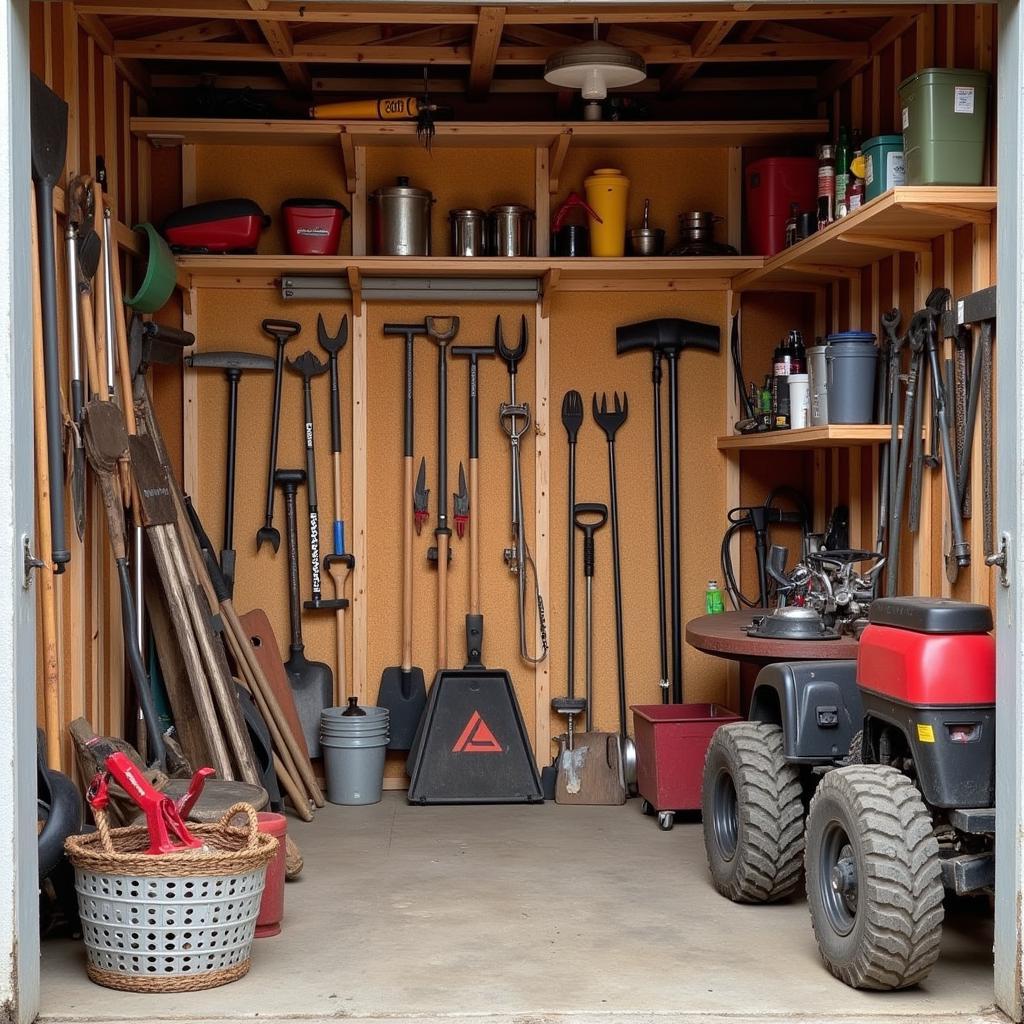Proper Care And Maintenance Of Farm Tools is crucial for their longevity, efficiency, and overall farm productivity. Neglecting these essential practices can lead to premature wear and tear, breakdowns, and ultimately, increased costs. This article provides a comprehensive guide to maintaining your farm tools, ensuring they remain in top condition for years to come.
Why is Care and Maintenance of Farm Tools Important?
Maintaining your farm tools isn’t just about keeping them looking shiny; it’s about ensuring they operate efficiently and safely. A well-maintained tool performs its intended function effectively, reducing the effort required and improving the quality of work. Regular care and maintenance of farm tools can significantly reduce downtime due to unexpected breakdowns, ensuring that crucial farming operations stay on schedule. This ultimately contributes to increased productivity and profitability. Additionally, well-maintained tools are safer to use, minimizing the risk of accidents and injuries.
Essential Steps for Care and Maintenance of Farm Tools
Cleaning
The first step in maintaining any farm tool is cleaning. Remove dirt, debris, and plant matter after each use. For metal tools, use a wire brush, scraper, or even a pressure washer. Wooden handles benefit from a gentle scrubbing with soapy water.
What is the first step in maintaining farm tools? Cleaning is crucial for all farm tools.
Inspection
After cleaning, inspect your tools for any signs of damage, wear, or loose parts. Look for cracks, rust, or worn-out edges. Identify and address these issues promptly to prevent further deterioration.
Sharpening and Lubrication
Sharp tools are essential for efficient work. Sharpen blades, cutting edges, and pruning tools regularly using appropriate sharpening tools like files or grinders. Apply lubricating oil to moving parts to reduce friction and prevent rust.
Why should you lubricate your farm tools? Lubrication reduces friction and prevents rust, extending the lifespan of your tools.
Storage
Proper storage is critical for preserving your tools. Store tools in a clean, dry place, preferably hanging on a wall or organized in a toolbox. car tool rolls can also be used. Avoid leaving tools exposed to the elements, as this can lead to rust and corrosion.
 Organized storage of farm tools in a shed
Organized storage of farm tools in a shed
Specific Care for Different Types of Farm Tools
- Hand Tools: Clean and sharpen regularly. Apply linseed oil to wooden handles to prevent drying and cracking.
- Power Tools: Follow the manufacturer’s recommendations for maintenance and lubrication. Check and replace worn-out parts promptly.
- Tractors and Machinery: Conduct regular maintenance checks as outlined in the owner’s manual. This includes checking fluids, filters, and belts. maintenance and care of farm tools offer more detailed guides.
neogen hoof care tools and evolutionary hoof care tools require specialized care, so always refer to the manufacturer’s instructions.
“Regular maintenance is the key to maximizing the lifespan and performance of your farm equipment,” says John Deere, a seasoned agricultural machinery expert.
Conclusion
Care and maintenance of farm tools are essential for ensuring their longevity, efficiency, and safety. By following the simple steps outlined in this article, you can significantly extend the lifespan of your tools, reduce downtime, and improve overall farm productivity. Remember, a small investment in regular maintenance can save you significant costs in the long run.
FAQ
- How often should I sharpen my farm tools?
- What type of oil should I use for lubrication?
- How do I prevent rust on my farm tools?
- What are the best storage practices for farm tools?
- How often should I conduct maintenance checks on my tractor?
- Where can I find reliable information on specific tool maintenance?
- What are the common signs of wear and tear on farm tools?
Common Scenarios
- Scenario 1: Your hoe is dull and makes working the soil difficult. Solution: Sharpen the hoe using a file or grinder.
- Scenario 2: Your tractor is leaking oil. Solution: Check for leaks and repair or replace damaged parts. Consult your owner’s manual or a mechanic.
Further Reading and Resources
For more information on maintaining specific types of farm equipment, please visit our website for related articles.
Need help? Contact us via WhatsApp: +1(641)206-8880, Email: [email protected] or visit our office at 910 Cedar Lane, Chicago, IL 60605, USA. Our customer service team is available 24/7.

Leave a Reply